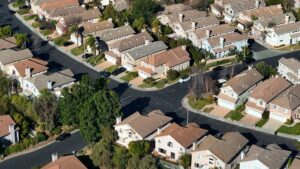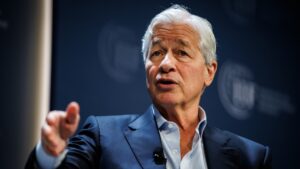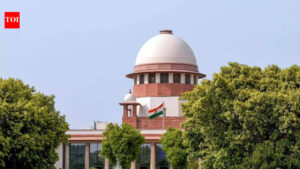Jerome Powell Pressed Over How Fed Would Respond to Economic Slowdown

Lawmakers pressed Federal Reserve Chairman
Jerome Powell
over how the central bank would manage trade-offs it could confront if its interest-rate increases slow the economy sharply but don’t reduce inflation quickly.
Mr. Powell on Thursday said that in such a scenario, the central bank would be reluctant to shift from raising rates to cutting them until it saw clear evidence that inflation was coming down in a convincing fashion.
“We can’t fail on this. We really have to get inflation down,” Mr. Powell said during the second of two days of testimony. “We’re going to want to see evidence that it really is coming down before we declare any kind of victory,” he told the House Financial Services Committee.
Rep. Trey Hollingsworth (R., Ind.) said he was worried that by waiting for evidence of inflation to slow, the Fed would rely heavily on an indicator that lags economic activity. He asked Mr. Powell how the Fed would respond to a situation where inflation is still high “and unemployment is escalating quickly, and economic growth is negative.”
“In that hypothetical situation, that would be a setting in which inflation could be expected to come down,” Mr. Powell said, which could meet a test the Fed has established to slow or stop rate rises. But he added, “I think we’d be reluctant to cut.”
The exchange highlighted an important dilemma that many central banks might eventually face. Faced with high inflation in the mid-1970s, for example, the Fed raised rates aggressively but not enough to break the back of high inflation, forcing stiffer action later.
Rising fuel costs and supply-chain disruptions from Russia’s war against Ukraine have sent prices up in recent months, adding to already-high inflation last year as demand surged from the reopening of the economy and aggressive government stimulus.
Since March, the Fed has raised its benchmark federal-funds rate three times from near zero to a range between 1.5% and 1.75%, including a 0.75-percentage-point rate rise last week, the largest in 28 years. Mr. Powell and several colleagues have signaled that another increase of that magnitude could be likely at the Fed’s next meeting, July 26-27.
The hearing underscored a related challenge facing the Fed: Officials are raising rates at the most aggressive pace since the 1980s in part because of concerns that higher prices could change consumer psychology in ways that sustain high inflation.
Economists believe expectations of future inflation can be self-fulfilling, which means the Fed could be required to lift rates to levels that push even harder on the monetary brakes if those expectations rise.
“As a general matter, people do expect inflation to come back down to levels that are consistent with our price-stability mandate,” Mr. Powell said Thursday. “But we haven’t had a test like this. We haven’t had an extended period of high inflation for some time. So it’s not a comfortable place to be.”
Typically, the Fed focuses on so-called core inflation, which excludes food and energy prices, because officials believe that measure provides a better gauge of underlying price pressures. But Mr. Powell said the Fed might be less willing to look past higher prices at the pump because that could push up consumers’ inflation expectations.
“There are some small signs, concerning signs” that inflation expectations are rising, Mr. Powell said. “And we just can’t allow that.”
Two days of hearings with Mr. Powell spotlighted the difficult politics of high inflation. Lawmakers in both parties tried to use the Fed chairman as a foil to amplify their broader political messages.
Republicans, for example, sought to dispute President Biden’s efforts to blame higher prices this year on Russian President
invasion of Ukraine by asking Mr. Powell if the war had been the primary driver of inflation in the U.S.
“No,” Mr. Powell responded on Wednesday. “Inflation was high before—certainly before the war in Ukraine broke out.”
Republicans and Democrats also raised concerns that the Fed’s plans to slow the economy to bring down inflation would push the economy into a recession, but they differed over who should take the blame.
Democrats warned the Fed’s rate increases would do little to relieve rising energy or food prices and that they could exacerbate supply shortages by slowing investment; for example, some warned of rate rises chilling new housing construction and exacerbating supply shortages.
“The wrong medication can cause even more harm and make the patient more ill,” said Rep.
Ayanna Pressley
(D., Mass.). “This knee-jerk response to raise interest rates is so alarming” due to the role that global shocks such as the pandemic and the war in Ukraine have played in pushing up prices, she said.
SHARE YOUR THOUGHTS
What actions should the Federal Reserve take on interest rates? Join the conversation below.
Mr. Powell said while there was little the Fed could do to address high food and energy prices, it still needed to slow demand growth to ease broader price pressures.
Meanwhile, Republicans largely faulted the Biden administration and said the Fed might have been able to avoid aggressive measures if the White House was doing more to ease supply constraints, including by encouraging more domestic energy production.
“We can raise interest rates over and over, but the only way to curb a disaster this bad is to raise interest rates to a catastrophic level,” said Rep.
Tom Emmer
(R., Minn.).
Mr. Powell tried to avoid getting pinned down in a partisan fight, but at one point, he allowed that an increase in energy production could bring down gas prices. “Obviously, the more supply there is, the price of something can go down,” he said.
Rep.
Alexandria Ocasio-Cortez
(D., N.Y.) pressed Mr. Powell to endorse other methods besides rate increases to bring down inflation, such as stiffer antitrust regulation or limiting price increases for government contractors.
Mr. Powell demurred. “There’s a long history of price controls when inflation has been high,” he said, “and it was not a successful one.”
After Democrats highlighted the global nature of high inflation, Rep.
Ann Wagner
(R., Mo.) retorted, “No one in [my] district gives a rip what the price of gas and groceries are in Europe. They care about what they are at the corner of Manchester Road and Weidman.”
Write to Nick Timiraos at nick.timiraos@wsj.com
Copyright ©2022 Dow Jones & Company, Inc. All Rights Reserved. 87990cbe856818d5eddac44c7b1cdeb8









